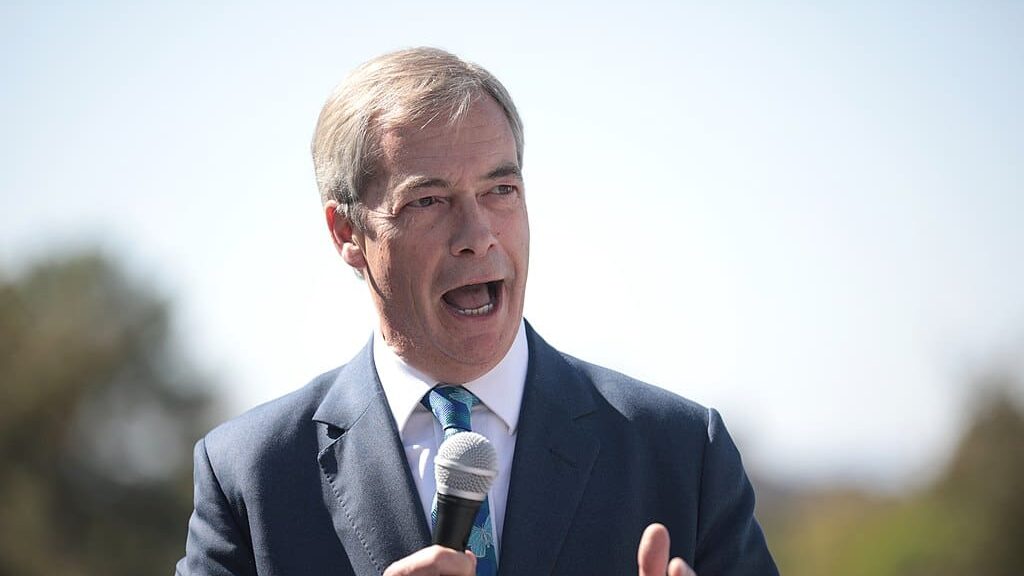
Nigel Farage
Gage Skidmore from Surprise, AZ, United States of America, CC BY-SA 2.0, via Wikimedia Commons
“This will grow, you watch.”
That was Nigel Farage’s message after polling suggested for the first time that Reform UK (formerly the Brexit Party) could win parliamentary seats at the July 4th general election.
Reform was polling just two points behind the Conservatives—Britain’s, if not the world’s, most successful political party—at the time. Now, less than a fortnight later, a YouGov poll has put it ahead of the Tories.
Latest YouGov voting intention (12-13 Jun): Reform now 1pt ahead of the Tories for the first time, although this is still within the margin of error
— YouGov (@YouGov) June 13, 2024
Con: 18% (no change from 10-11 Jun)
Lab: 37% (-1)
Reform UK: 19% (+2)
Lib Dem: 14% (-1)
Green: 7% (-1)
SNP: 3% (+1)… pic.twitter.com/brNybrUCbC
This is a “symbolic moment that deals another blow to Rishi Sunak’s electoral hopes,” said journalist Christopher Hope. The poll is particularly stinging for Sunak since it was carried out after the Tories released their “thin gruel” manifesto. Dropping below Reform can hardly be the endorsement he was looking for!
“It means,” added political academic Matthew Goodwin, that “we are now on the cusp of something truly historic in British politics. An inflection point. A major turning point when Reform might start to replace the Conservative Party in the polls and, over the longer-term, the political system.”
Recently Farage has taken issue with polling companies for questioning voters while labelling Reform UK as ‘Other,’ i.e. grouped with fringe parties. He has also objected to the way that national polling hides clear first- or second-place polling for Reform in England’s northeast, northwest, and East Midlands because results in these regions are bundled with London and Scotland. Each complaint has been both strengthened and overshadowed by Reform leading the Tories in the polls.
A problem for Farage now is that—thanks to Britain’s first-past-the-post electoral system—Reform could win millions of votes on July 4th and still pick up fewer than a handful of parliamentary seats.
However, Labour is obviously rattled by Reform’s rise in the polls, as shown by its fresh (and inaccurate) hit pieces on Farage on social media.
Fact 👇 pic.twitter.com/YicTa6CAym
— The Labour Party (@UKLabour) June 13, 2024
And so it should be, since Reform’s rise has taken place at the same time as Labour falling about 10 points in the polls.
Farage has made it clear since he became Reform leader earlier this month that his is a long-term plan—to become a serious opposition force to the likely incoming Labour government after this election and to gun for proper power at the 2029 general election.
Insofar as polling can be trusted, this is still mainly a problem for the Tories. For weeks, they have claimed that a vote for Reform would help only to prevent Conservatives from winning parliamentary seats, thus handing Labour a bigger majority in Parliament than it would otherwise achieve. In last night’s seven-way party leaders debate, Tory grandee Penny Mordaunt used this line to paint Farage as a “Labour enabler.”
Farage responded by flipping the Tory line on its head: “We are ahead of you in the polls—a vote for you is a vote for Labour.”
In short, Farage is now using his poll lead to suggest that voting Conservative is a wasted vote which will only help Sir Keir Starmer to power. “The entire Tory strategy,” Goodwin concludes, “has just been blown to pieces.”
